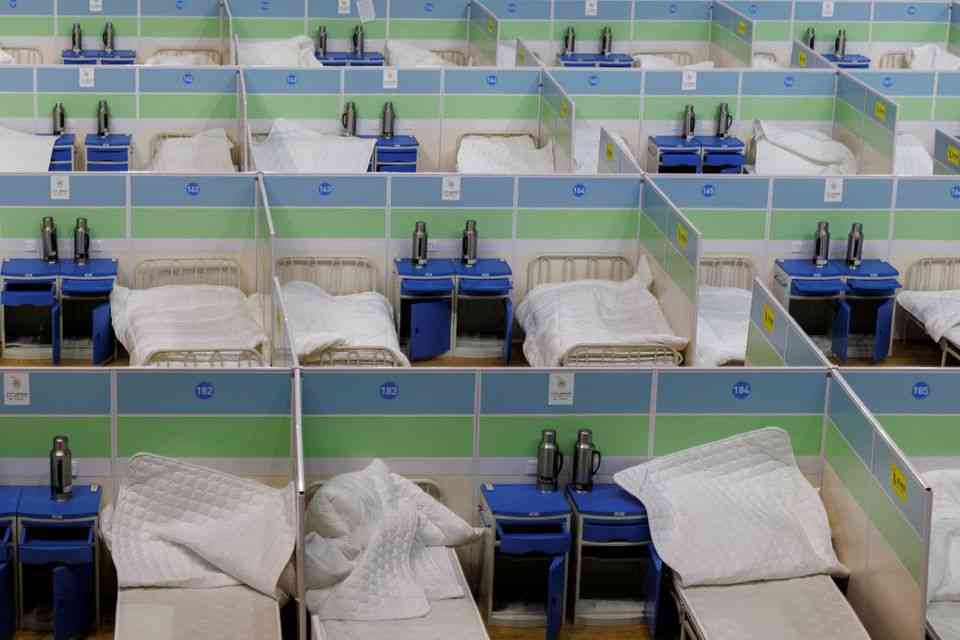
Cities across China scrambled to install hospital beds and build fever screening clinics on Tuesday as authorities reported five more deaths and international concern grew about Beijing's surprise decision to let the virus run free.
China this month began dismantling its stringent "zero-COVID" regime of lockdowns and testing after protests against curbs that had kept the virus at bay for three years but at a big cost to society and the world's second-largest economy.
Now, as the virus sweeps through a country of 1.4 billion people who lack natural immunity having been shielded for so long, there is growing concern about possible deaths, virus mutations and the impact on the economy and trade.
"Every new epidemic wave in another country brings the risk of new variants, and this risk is higher the bigger the outbreak, and the current wave in China is shaping up to be big," said Alex Cook, vice-dean for research at the National University of Singapore's Saw Swee Hock School of Public Health.
"However, inevitably China has to go through a large wave of COVID-19 if it is to reach an endemic state, in a future without lockdowns and the economic and political damage that results."
U.S. State Department spokesperson Ned Price said on Monday the potential for the virus to mutate as it spreads in China was "a threat for people everywhere".
Beijing reported five COVID-related deaths on Tuesday, following two on Monday, which were the first fatalities reported in weeks. In total, China has reported just 5,242 COVID deaths since the pandemic emerged in the central city of Wuhan in late 2019, a very low toll by global standards.
This came out when Jack and his accomplice, Munyaradzi Mupazviripo (49), appeared before Harare magistrate Dennis Mangosi to answer to a charge of impersonating State agents.
Mangosi remanded the pair in custody to December 30 for bail application.
Allegations are that on December 5 this year at around 10:30am, Jack visited Muguti’s offices at Investment House, number 109 Rotten Row, Harare. He was referred to Herbert Chipfunde, who asked him to identify himself.
But there are rising doubts that the statistics are reflecting the true impact of a disease ripping through cities after China dropped curbs including most mandatory testing on Dec. 7.
Since then, some hospitals have become inundated, pharmacies emptied of medicines, while many people have gone into self-imposed lockdowns, straining delivery services.
"It's a bit of a burden to suddenly reopen when the supply of medications was not sufficiently prepared," said Zhang, a 31-year-old delivery worker in Beijing who declined to give his full name. "But I support the reopening.”
Some health experts estimate 60% of people in China - equivalent to 10% of the world's population - could be infected over coming months, and that more than 2 million could die.
In the capital, Beijing, security guards patrolled the entrance of a designated COVID-19 crematorium where Reuters journalists on Saturday saw a long line of hearses and workers in hazmat suits carrying the dead inside. Reuters could not establish if the deaths were due to COVID.
In Beijing, which has emerged as the main infection hot spot, commuters, many coughing into their masks, were back on the trains to work and streets were coming back to life after being largely deserted last week.
Streets in Shanghai, where COVID transmission rates are catching up with Beijing's, were emptier, and subway trains were only half-full.
"People are staying away because they are sick or scared of getting sick, but mostly now, I think it’s because they are actually sick,” said Yang, a trainer at a nearly empty Shanghai gym.
Top health officials have softened their tone on the threat posed by the disease in recent weeks, a U-turn from previous messaging that the virus had to be eradicated to save lives even as the rest of the world opened up.
They have also been playing down the possibility that the now predominant Omicron strain could become more virulent.
"The probability of a sudden large mutation ... is very low," Zhang Wenhong, a prominent infectious disease specialist, told a forum on Sunday in comments reported by state media.
Nevertheless, there are mounting signs the virus is buffeting China's fragile health system.
Cities are ramping up efforts to expand intensive care units and build fever clinics, facilities designed to prevent the wider spread of contagious disease in hospitals.
In the past week, major cities including Beijing, Shanghai, Chengdu, and Wenzhou announced they had added hundreds of fever clinics, some in converted sports facilities.
The virus is also hammering China's economy, expected to grow 3% this year, its worst performance in nearly half a century. Workers and truck drivers falling ill are slowing down output and disrupting logistics, economists say.
A World Economics survey showed on Monday China's business confidence fell in December to its lowest since January 2013.
Weaker industrial activity in the world's top oil importer has capped gains for crude prices and driven copper lower.
China kept benchmark lending interest rates unchanged for the fourth consecutive month on Tuesday.







